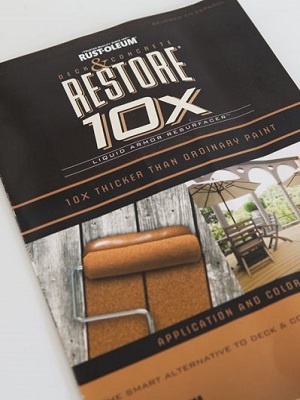A Chicago federal judge has signed off on a $9.3 million settlement deal – including more than $3 million in attorney fees – ending years of litigation against Rustoleum over damage allegedly caused to decks and patios by the company’s “Restore” product line.
On March 6, U.S. District Judge Amy J. St. Eve granted final approval to the settlement between Rustoleum and attorneys representing a class of potentially tens of thousands of plaintiffs who claimed their wooden decks and patios had been damaged or ruined by the Rustoleum products.
The judge’s approval was delivered in a short order, in which St. Eve said she was approving plaintiffs’ motions for attorney fees, class representative incentive awards and final approval of the settlement.

With the settlement approval, the judge dismissed the case with prejudice.
St. Eve had granted preliminary approval to the settlement in October, and had overruled all objections to the settlement in a Feb. 21 order.
In a motion presented to the court in February, lawyers for the plaintiffs said the settlement would result in awards potentially worth hundreds of dollars to every class member who could submit valid claims demonstrating Rustoleum’s products had damaged their property.
The huge consolidated case had landed in Chicago federal court in 2014, after a federal judicial panel combined lawsuits filed by a group of 40 named plaintiffs in federal district courts across the country. The lawsuits all accused Rustoleum of selling its products under the “Restore 10X” and “Deck & Concrete Restore” labels, despite allegedly knowing the products contained “latent defects” that caused the product to prematurely chip, blister and peel, and otherwise damaged decks and patios to which they were applied.
The plaintiffs said they had purchased and applied the products from 2010-2015.
The lawsuits alleged breach of warranties and violations of consumer fraud and false advertising laws throughout the U.S., among other allegations.
While the litigation had survived Rustoleum’s attempts to dismiss it, the two sides told the judge in the fall of 2016 that they had reached a deal to end the matter before it went to trial.
Under the deal, Rustoleum would pay more than $9.3 million into a settlement fund.
Plaintiffs’ attorneys would receive a little more than $3.1 million in fees and costs.
The remaining $6.2 million would be sued to pay administration costs and claims, according to the motion for settlement.
Claims would be paid based on three tiers: Class members who can establish an eligible claim could be in line to be reimbursed for the cost of the product they purchase; paid $2 per square foot of their deck, if they paid to have the product removed from the deck; or paid $6 per square foot of their deck, if they paid to have decking repaired or replaced. The settlement noted some eligible class members could qualify for payment under multiple tiers, meaning their total reimbursement could reach into the thousands of dollars, depending on the size of the deck to which the Restore product was applied.
“Those who experienced greater levels of damage will be able to recoup a higher payment in multiple tiers from the Settlement Fund,” the plaintiffs’ lawyers said in their settlement motion.
The final settlement motion indicated direct notice of the settlement was sent, either by email or the U.S. Postal Service, to more than 24,000 potential class members. Attorneys for the plaintiffs also advertised the settlement in newspapers, online and in other ways, the settlement motion said.
Lead attorneys representing the plaintiffs included those of the firms of Lite DePalma Greenberg LLC, of Chicago, and Audet & Partners LLP, of San Francisco. Other law firms who represented plaintiffs in the action included: Lockridge Grindal Nauen PLLP, of Minneapolis; Levin Fishbein Sedran & Berman, of Philadelphia; Wexler Wallace LLP, of Chicago; Kohn Swift & Graf P.C., of Philadelphia; Cueno Gilbert & LaDuca LLP, of Washington, D.C.; Quantum Legal LLC, of St. Louis; McCuneWright LLP, of Berwyn, Pa.; Bloom & Bloom P.C., of New Windsor, N.Y.; Rhine Martin Law Firm P.C., of Wilmington, N.C.; Law Office of Jean Sutton Martin PLLC, of Wilmington, N.C.; and attorney Robert N. Isseks, of Middletown, N.Y.
Rustoleum was defended by the firms of Mayer Brown LLP, of Chicago; Millberg Gordon and Stewart PLLC, of Raleigh, N.C.; and Hangley Aronchick Segal and Pudlin, of Philadelphia.
